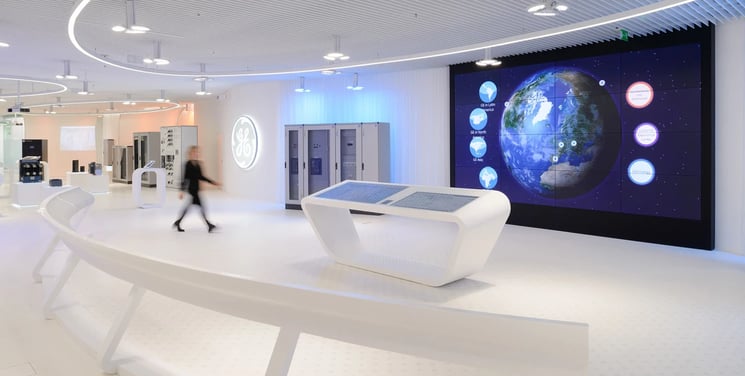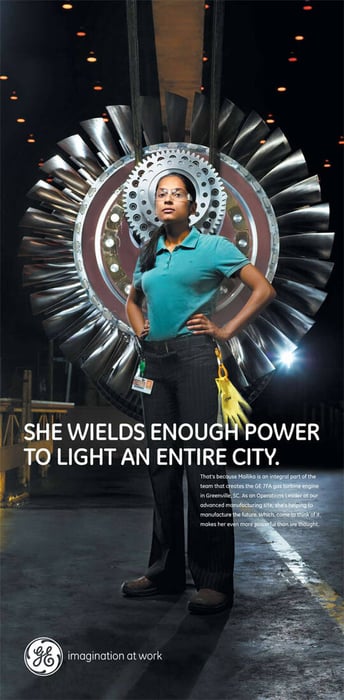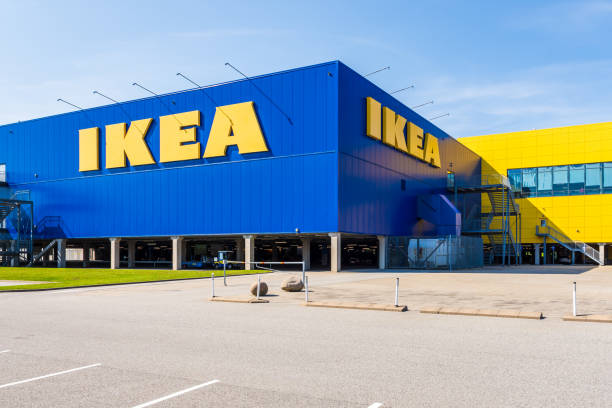In this blog, we explore the world of General Electric’s psychology-driven marketing, outlining how they leverage cognitive biases to position themselves as an undeniable industry leader.
In the world of B2B marketing, US industrial conglomerate, General Electric (GE), has long stood out as one of the most ambitious and progressive brands. With a legacy spanning more than a century, GE has not only successfully navigated challenging economic landscapes - but has also emerged as a benchmark for marketing excellence.
The roots of their remarkable marketing success lie within psychology, underpinning both digital and out-of-home (OOH) strategies to set them apart from competitors. In this blog, we dive into how you can take inspiration from GE and utilise behavioural economics to nudge buyers into using them as their top supplier of choice.
Peak-end rule
GE’s Monogram Experience Centres are a great example of how they harness the power of the peak-end rule. This rule suggests that people judge an experience based on its peak (the most intense moment) and its end, rather than considering the experience as a whole. In marketing, this bias can be leveraged to enhance customer satisfaction by focusing on creating memorable peaks and positive endings.
GE’s state-of-the-art showrooms provide customers with a hands-on opportunity to explore the full range of GE Monogram luxury appliances for themselves.

At these experience centres, customers are treated to immersive demonstrations of GE’s premium Monogram appliances, showcasing their expert craftsmanship and innovative features. From live cooking demonstrations to personalised consultations with expert staff, each visit is tailored to create memorable peak moments that showcase the brand's commitment to excellence.
Halo effect
A compelling example of GE leveraging the halo effect is their ‘Ecomagination’ initiative. The halo effect refers to the tendency of individuals to extend their overall positive impression of a person, brand, or product to specific attributes associated with them. Leveraging the halo effect in marketing involves capitalising on positive associations to enhance the perceived value or appeal of a brand.
Through their sustainability-focused ‘Ecomagination’ programme, GE promotes environmentally-friendly technologies and solutions aimed at addressing pressing global challenges such as climate change and resource depletion.

By strongly associating themselves with innovation and sustainability, GE’s Ecomagination initiative extends the halo effect to other products and solutions offered by the company. Consumers perceive these products as not only technologically advanced but also environmentally responsible, enhancing their appeal and desirability. And, as consumer behaviours are shifting to prioritise companies that have strong DEI and ESG policies, this effect plays into the hands of this change.
As the experience draws to a close, customers are offered special incentives and exclusive perks, such as extended warranties or complimentary installation services, ensuring that their journey ends on a positive note. By orchestrating peak experiences and delivering positive endings, GE leaves a lasting impression that resonates with customers long after they leave.
Authority bias
The authority bias refers to the tendency of individuals to attribute greater accuracy and credibility to the opinions or actions of authority figures. In marketing, leveraging authority figures can influence consumer perceptions and drive purchasing decisions.
GE strategically harnesses the authority bias by partnering with industry experts, thought leaders, and influential figures to endorse their products and services.
A prime example of this is their previous partnership with Bill Nye, popularly known as "The Science Guy." In collaboration with Bill Nye, and other industry thought leaders, GE launched the "GE Focus Forward" campaign, which aimed to highlight innovations that have the potential to change the world.
Through a series of captivating short films featuring Bill Nye and other prominent figures in science and technology, General Electric showcased their commitment to innovation and sustainability. By aligning themselves with respected, well-known authority figures, GE not only enhanced their brand credibility but also inspired trust and confidence among consumers.
Social proof
Social proof is the psychological phenomenon where people assume the actions of others in an attempt to reflect ‘correct’ behaviour. In marketing, leveraging social proof involves demonstrating that others have already chosen a product or service, thereby influencing potential customers to follow suit.
A particularly notable example of GE harnessing social proof is their “Imagination at Work” campaign, launched across various media channels. The campaign focused on showcasing the positive impact GE’s products have had on communities around the world, featuring the skills of real employees.


The authenticity of this campaign hugely tapped into the power of social proof, demonstrating the widespread acceptance and trust in the brand. This enabled the campaign to resonate with a wide variety of audiences.
Mere exposure effect
The mere exposure effect occurs when people develop a preference for things they are familiar with, simply because they have been exposed to them repeatedly. In marketing, this involves increasing brand visibility and exposure to enhance consumer preference and familiarity with a brand.
General Electric strategically harnesses the mere exposure effect by maximising brand visibility across various touchpoints and channels. By consistently exposing consumers to their brand through advertising, sponsorships, and partnerships, they increase familiarity and preference among their target audience.
For example, GE has been a long-time sponsor of the Olympic Games. Through extensive advertising campaigns, on-site activations and digital promotions showcasing their commitment to innovation and global impact, GE maximised their brand exposure to a hugely diverse audience. And by aligning themselves with an event as prestigious as the Olympics, they continue to enhance familiarity and preference for their brand.
General Electric’s marketing mastery
In an increasingly competitive industrial marketing space, GE stands as a shining example of how psychological principles can be harnessed to captivate audiences and drive commercial success.
From leveraging social proof to amplifying experiences through the peak-end rule, GE demonstrates a thorough understanding of the power of cognitive biases across multiple channels and touchpoints. Their approach is as innovative as it is effective, delivering key inspiration for other brands to help cultivate strong brand affinity, trust and loyalty amongst their audience.
Want to learn more about other psychological biases? Check out our other blogs here.
You can also view other psychological principles in action in our new guide: ‘4 Big Challenges for Brands in 2024 and How to Solve them Using Psychology’. Download your copy below.






